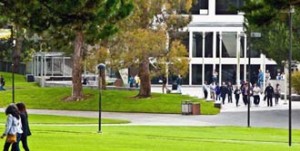Pushing against the limits they set a few months ago, California State University trustees have given the maximum allowable salaries to two new campus presidents, and nearly the maximum for one more.

Big salaries offered to presidents have drawn criticism at a time when the university system has cut back on course offerings and hiked tuition. So in May, the trustees approved a policy limiting the salaries of new presidents to 10 percent more than their predecessors' salaries. The extra 10 percent has to come from private foundations.
On Tuesday, the trustees immediately zoomed to that maximum.
Diane Harrison at CSU Northridge and Leslie Wong at San Francisco State will make $324,500 a year each, and Tomas Morales at CSU San Bernardino will earn $319,000, according to AP.
Those salaries represent a 10 percent increase over those of outgoing presidents at Northridge and San Bernadino, and a nine percent increase at San Francisco.